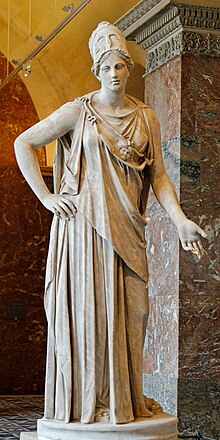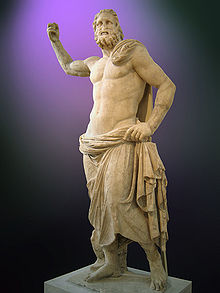Athena
Goddess of wisdom, warfare, and handicraft
[1]Member of the
Twelve Olympians
Mattei Athena at
Louvre. Roman copy from the 1st century BC/AD after a Greek original of the 4th century BC attributed to Cephisodotos or
Euphranor.
Abode
Mount OlympusAnimals
Owl, serpent, spider, horseSymbol
Aegis, helmet, spear, armor,
Gorgoneion, chariot,
distaffTreeOlivePersonal informationParents
Zeus and
Metis[a]Siblings
Aeacus,
Angelos,
Aphrodite,
Apollo,
Ares,
Artemis,
Dionysus,
Eileithyia,
Enyo,
Eris,
Ersa,
Hebe,
Helen of Troy,
Hephaestus,
Heracles,
Hermes,
Minos,
Pandia,
Persephone,
Perseus,
Rhadamanthus, the
Graces, the
Horae, the
Litae, the
Muses, the
MoiraiChildren
Erichthonius (adopted)EquivalentsRoman equivalent
MinervaEtruscan equivalent
MenrvaHinduism equivalent
SarasvatiCanaanite equivalent
AnatEgyptian equivalent
NeithCeltic equivalent
Sulis
Athena[b] or Athene,[c] often given the epithet Pallas,[d] is an ancient Greek goddess associated with wisdom, warfare, and handicraft[1] who was later syncretized with the Roman goddess Minerva. Athena was regarded as the patron and protectress of various cities across Greece, particularly the city of Athens, from which she most likely received her name. The Parthenon on the Acropolis of Athens is dedicated to her. Her major symbols include owls, olive trees, snakes, and the Gorgoneion. In art, she is generally depicted wearing a helmet and holding a spear.
From her origin as an Aegean palace goddess, Athena was closely associated with the city. She was known as Polias and Poliouchos (both derived from polis, meaning "city-state"), and her temples were usually located atop the fortified acropolis
in the central part of the city. The Parthenon on the Athenian
Acropolis is dedicated to her, along with numerous other temples and
monuments. As the patron of craft and weaving, Athena was known as Ergane. She was also a warrior goddess, and was believed to lead soldiers into battle as Athena Promachos. Her main festival in Athens was the Panathenaia, which was celebrated during the month of Hekatombaion in midsummer and was the most important festival on the Athenian calendar.
In Greek mythology, Athena was believed to have been born from the forehead of her father Zeus. In some versions of the story, Athena has no mother and is born from Zeus' forehead by parthenogenesis. In others, such as Hesiod's Theogony, Zeus swallows his consort Metis,
who was pregnant with Athena; in this version, Athena is first born
within Zeus and then escapes from his body through his forehead. In the founding myth of Athens, Athena bested Poseidon in a competition over patronage of the city by creating the first olive tree. She was known as Athena Parthenos "Athena the Virgin," but in one archaic Attic myth, the god Hephaestus tried and failed to rape her, resulting in Gaia giving birth to Erichthonius,
an important Athenian founding hero. Athena was the patron goddess of
heroic endeavor; she was believed to have aided the heroes Perseus, Heracles, Bellerophon, and Jason. Along with Aphrodite and Hera, Athena was one of the three goddesses whose feud resulted in the beginning of the Trojan War.
She plays an active role in the Iliad, in which she assists the Achaeans and, in the Odyssey, she is the divine counselor to Odysseus. In the later writings of the Roman poet Ovid, Athena was said to have competed against the mortal Arachne in a weaving competition, afterward transforming Arachne into the first spider; Ovid also describes how she transformed Medusa into a Gorgon after witnessing her being raped by Poseidon in her temple. Since the Renaissance, Athena has become an international symbol of wisdom, the arts, and classical learning. Western artists and allegorists have often used Athena as a symbol of freedom and democracy.
Poseidon
- King of the sea
- God of the sea, storms, earthquakes, and horses
Member of the
Twelve Olympians
Abode
Mount Olympus, or the seaSymbol
Trident, fish, dolphin, horse, bullPersonal informationParents
Cronus and
RheaSiblings
Hades,
Demeter,
Hestia,
Hera,
Zeus;
Chiron (
half)Consort
Amphitrite,
Aphrodite,
Demeter,
various othersChildren
Theseus,
Triton,
Polyphemus,
Orion,
Belus,
Agenor,
Neleus,
Atlas,
Pegasus,
Chrysaor,
CymopoleaRoman equivalent
Neptune
Poseidon (;[1] Greek: Ποσειδῶν) was one of the Twelve Olympians in ancient Greek religion and mythology, presiding over the sea, storms, earthquakes and horses.[2] He was the protector of seafarers and the guardian of many Hellenic cities and colonies. In pre-Olympian Bronze Age Greece, Poseidon was venerated as a chief deity at Pylos and Thebes, with the cult title "earth shaker";[2] in the myths of isolated Arcadia, he is related to Demeter and Persephone and was venerated as a horse, and as a god of the waters.[3] Poseidon maintained both associations among most Greeks: He was regarded as the tamer or father of horses,[2] who, with a strike of his trident, created springs (in the Greek language, the terms for both are related).[4] His Roman equivalent is Neptune.
Homer and Hesiod suggest that Poseidon became lord of the sea when, following the overthrow of his father Cronus, the world was divided by lot
among Cronus' three sons; Zeus was given the sky, Hades the underworld,
and Poseidon the sea, with the Earth and Mount Olympus belonging to all
three.[2][5] In Homer's Iliad, Poseidon supports the Greeks against the Trojans during the Trojan War; in the Odyssey, during the sea-voyage from Troy back home to Ithaca, the Greek hero Odysseus provokes Poseidon's fury by blinding his son, the Cyclops Polyphemus,
resulting in Poseidon punishing him with storms, causing the complete
loss of his ship and companions, and delaying his return by ten years.
Poseidon is also the subject of a Homeric hymn. In Plato's Timaeus and Critias, the legendary island of Atlantis was Poseidon's domain.[6][7][8]
According to legend, Athena became the patron goddess of the city of
Athens after a competition with Poseidon, though he remained on the
Acropolis in the form of his surrogate,
Erechtheus. After the fight, Poseidon sent a monstrous flood to the
Attic plain to punish the Athenians for not choosing him.


